ICICI Bank’s Initiatives on Environment
ICICI Bank’s environment conservation initiatives are designed to reduce our carbon footprint through a 3R (Reduce, Reuse, Recycle) approach. We have adopted an integrated ecological and environmental strategy for ensuring a more sustainable future. Our efforts are centred on constructing and maintaining green workspaces through energy conservation, water and waste management.
ICICI Bank has undertaken activities for environment conservation in conformity with the ISO 14001 standard for environmental management systems. The health and safety systems at 13 large offices of the Bank have been OHSAS 18001:2007 certified. ICICI Service Centre at Bandra-Kurla Complex (BKC), Mumbai is both OHSAS 18001:2007 and ISO 14001:2004 certified.
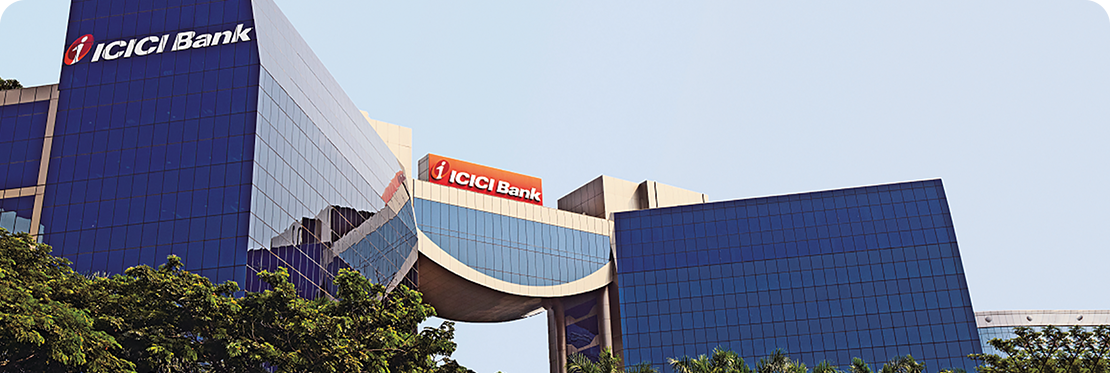
ICICI Service Centre in Mumbai is both OHSAS 18001:2007 and ISO 14001:2004 certified
ISO 14001:2004 specifies the requirements for an environmental management system and OHSAS 18001:2007 outlines an organisation's commitment to the health and safety of its employees.
ICICI Bank offices won prestigious awards for energy management
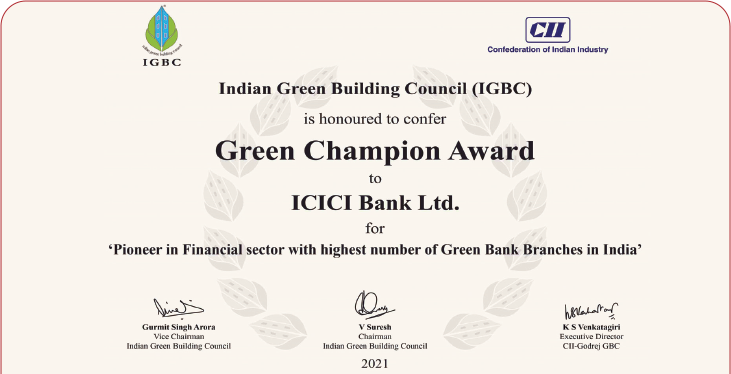
ICICI Bank received IGBC Green Champion Award for having the highest number of green branches in India. The Bank has 126 green branches and offices at March 31, 2022
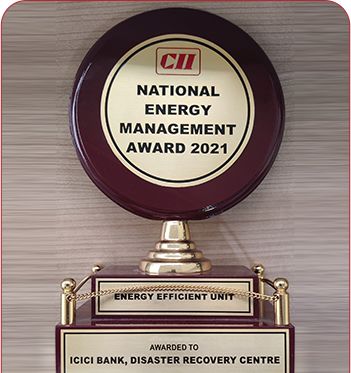
An award won by ICICI Bank for energy management
ICICI Bank's Regional Office at Shalimar Tower, Lucknow and the Regional Office at JS Tower, Kanpur were declared winners at the first and second position respectively.
Energy Conservation
Our energy conservation efforts are leading to a reduction in energy consumption across our operations. We have adopted a three-pronged approach to enable energy conservation by boosting energy efficiencies.
The pillars of this approach are:
Focus on
Design
Effective Operations &
Maintenance (O&M)
Practices
Enhance Renewable
Energy Usage
Focus on Design
Our initiatives for promoting sustainable designs focus on construction of green workplaces that are aligned to IGBC (Indian Green Building Council) standards. As many as 114 branches and offices, totalling 808,000 sq. ft. of area, have received IGBC certification in fiscal 2022. Half of them have received the Platinum rating, whereas 53 have the Gold rating. The Platinum rating is the highest possible rating by IGBC for sustainable practices and solutions a building uses to reduce detrimental impacts on the environment. For IGBC certification, key assessment metrics include energy efficiency, use of renewable energy, water conservation, waste management, indoor air quality and sustainable sourcing of material used. Since inception, we have received the IGBC certification for 126 branches and offices with a total 3.09 million sq. ft. of area which is equivalent to nearly 54 standard football grounds.
We continue to invest in energy-efficient equipment, such as LED lights, Inverter and Variable Refrigerant Flow (VRF) AC units, Modular Uninterruptible Power Source (UPS), and Energy Star labelled IT equipment. The 276 new branches added in fiscal 2022 were installed with energy-efficient equipment and water efficient plumbing fixtures.
Use of energy-efficient equipment has helped us to conserve raw materials, improve asset utilisation and reduce wastage over the complete lifecycle of equipment. Over the last seven years, the Connected Load per sq. ft. area has reduced from 20 Watts to 12 Watts. Connected Load is the total electric power-consuming rating of all devices such as lamps or motors connected to a distribution system.
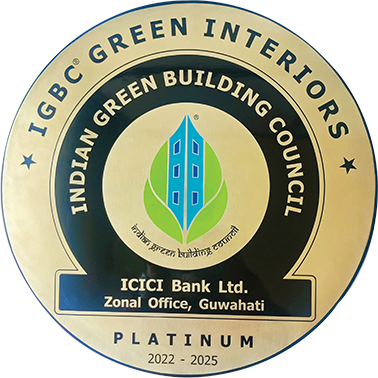
ICICI Bank Zonal office in Guwahati, Assam received IGBC's Platinum rating
A standard football field covers 57,600 sq. ft.
Effective Operations & Maintenance Practices
It is our constant endeavour to reduce operational emissions through adoption of advanced technologies and energy-efficient practices.
We track and record our energy usage regularly. In fiscal 2022, we consumed 127 million kilowatt-hour of energy at our branches and offices. The energy intensity in terms of kWh/sq.ft. is equivalent to a 4 star rating as per the benchmark for buildings issued by the Bureau of Energy Efficiency. Cumulative annual power utilisation effectiveness for our data centres was found to be 1.57 which is higher than the global benchmark of 1.7.
We have implemented a policy that ensures setting of temperature at 24oC across all our offices and branches. This enables optimal energy consumption for air-conditioners and is in accordance with ASHRAE (American Society of Heating, Refrigerating and Air- Conditioning Engineers), which is the recognised standard for ventilation system design and acceptable indoor air quality.
We have deployed IoT (Internet of Things) based monitoring and control of air-conditioning at 70 offices and branches in Mumbai. The system helps to schedule the operations of the air-conditioners as well as set a comfortable temperature as per footfall during the day. It has led to 15% savings in monthly energy consumption and 100% improvement of uptime. Further, we have deployed Lithium-ion battery backup systems at 38 new locations, branches and offices in Delhi NCR. These are eco-friendly alternatives to diesel generators as they minimise pollution and emissions.
We have developed an integrated maintenance portal, named iMaintain. The portal helps our equipment service partners to maintain critical equipment at our branches and offices on time. Our adherence to the preventive maintenance schedule has enhanced the life of the equipment, increased its uptime and reduced the number of breakdowns. As a result, our energy consumption has been significantly optimised.
Enhancing Renewable Energy Usage
We remain focused on adopting and investing in renewable energy for propelling sustainable growth across our systems and processes to reduce our carbon footprint.
During fiscal 2022, we took several initiatives to expand our solar capacity. During the year, 7% of the Bank's total electricity consumption was met by solar power.
Solar Power Capacity
260 kWp
(kilowatt peak)
On-site capacity addition of solar power at 17 offices in fiscal 2022
3,174 kWp
(kilowatt peak)
Total solar power installed capacity at March 31, 2022
Solar Power Generated for Consumption
3.21 Mn kWh
(kilowatt hour)
On-site generation
7.98 Mn kWh
(kilowatt hour)
Off-site Power Purchase Agreement
11.19 Mn kWh
(kilowatt hour)
Total
We reviewed our solar power purchase agreements with our vendors during fiscal 2022 to enhance the contribution of renewable energy to our total energy consumption.
We are progressively reducing our operational emissions by adopting new technologies and energy-efficient practices. Energy audit of our premises, investment in advanced technologies, adoption of green principles, and expansion of our renewable energy footprint are some of the measures we take to keep our emission intensity within reasonable levels.
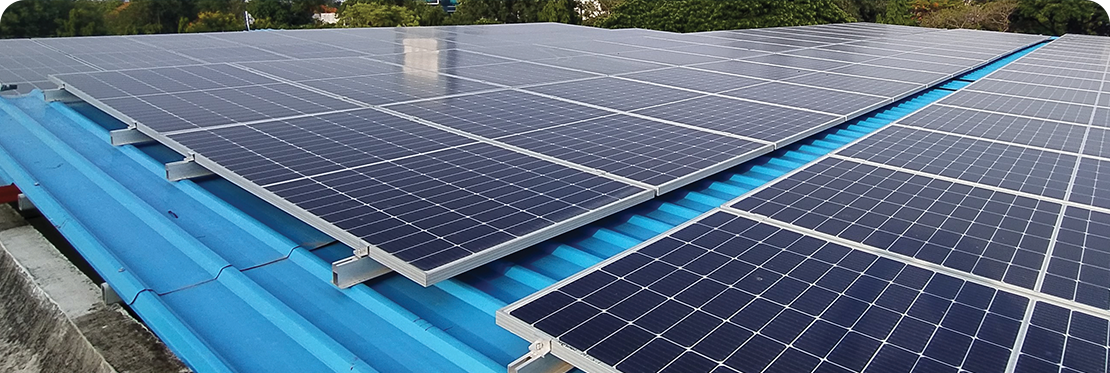
Rooftop solar panel at ICICI Bank’s Regional Office in Pune, Maharashtra
The Bank appointed a reputed organisation to conduct an independent limited assurance of the Bank’s Scope 1 and Scope 2 emissions in fiscal 2022. In absolute terms, the Bank’s GHG emissions increased by 3.6% in fiscal 2022. However, the year-on-year carbon emission per Full Time Equivalent (FTE) employee declined from 1.38 tCO2e in fiscal 2021 to 1.36 tCO2e in fiscal 2022. The Bank did not purchase carbon credits and related instruments during the year.
GHG Emission Metrics
tCO2e - Tonnes of carbon dioxide equivalent is a standard unit for counting GHG emissions.
Greenhouse Gas (GHG) Scope 1 emissions occur from sources such as boilers, furnaces, vehicles, owned or controlled by an
organisation.
GHG Scope 2 emissions are associated with the purchase of electricity, steam, heat or cooling.
Managing and Conserving Water
At ICICI Bank, we have prioritised effective water management and conservation to drive our sustainability journey. We have implemented rainwater harvesting at various locations across the country, including our large offices at Chandivali in Mumbai and Ambattur in Chennai. In fiscal 2022, we have set up storage tanks to harvest rain water at two offices in Pune with a combined capacity of over 400,000 litres.
We have installed water recycling facility at ICICI Service Centre at BKC, Mumbai with a capacity of 80 Kilolitre per day (KLD) and our office at Gachibowli, Hyderabad with a capacity of 700 KLD. Further, we use recycled water for the purpose of landscaping at our offices. Recycled water is also used in the cooling towers installed at our premises.
As a practice, we instal water-efficient plumbing fixtures at all new offices and branches. We follow the same strategy when it comes to replacing old fixtures.
Minimising and Disposing Waste
We have put in place a mechanism for disposal of waste in alignment with local and national regulations. We follow a structured methodology for disposal of dry, wet and e-waste generated in our operations. Our waste management initiatives include:
- Composting of organic and wet waste at some of our large offices and facilities.
- Ensuring that e-waste is not disposed of in landfills but is recycled or handed over to the authorised agencies.
- Reducing consumption of dry waste (paper and cardboard) through digitisation.
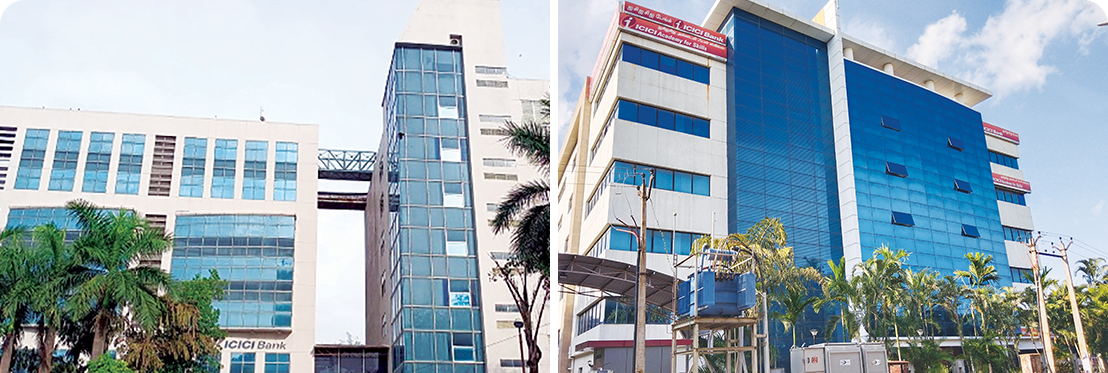
ICICI Bank offices with rainwater harvesting facility in Chandivali, Mumbai (left) and Ambattur, Chennai (right)
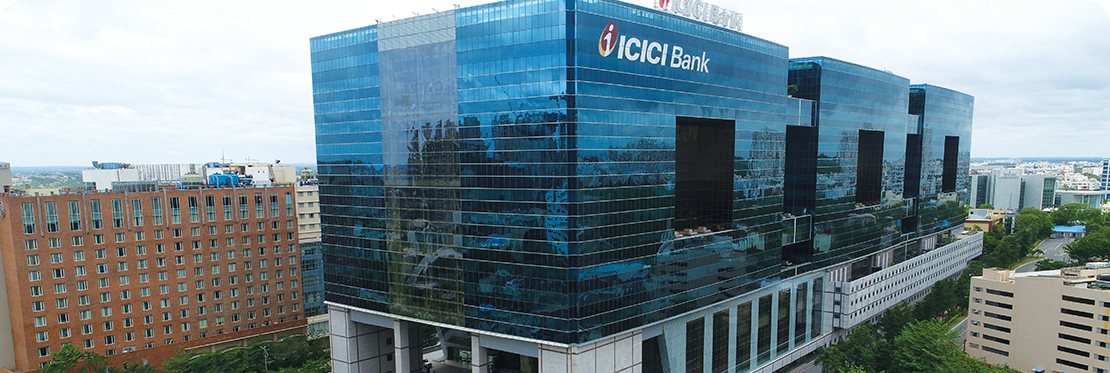
An ICICI Bank office in Gachibowli, Hyderabad equipped with water recycling facility
Case Study - ICICI Bank Regional Office in Pune, Maharashtra
Rated Platinum in IGBC Green Interiors Category
ICICI Bank continuously strives to raise the bar of its performance in environment conservation. Our regional office at Pune resonates with this commitment. The IGBC Platinum rating for the office validates the success of our efforts.
Various initiatives taken by the Bank for environment management at the Pune office can broadly be put under water conservation, energy efficiency, waste management, and enhanced fresh air ventilation.
The Bank has deployed a rainwater-harvesting system that helps it to collect 22,000 Kilolitre of rainwater during the monsoon season and save 38% of its water requirement. Additionally, we have installed water-efficient plumbing fixtures, such as auto-closing push taps and aerators in taps.
We have installed a 22 kWp (kilowatt peak) solar power plant at the rooftop premises. We have also met 51% of the office's energy needs with solar power. Further, we have equipped the building with LED lights and VRF (Variable Refrigerant Flow) based air-conditioning system as well as eco-friendly refrigerants. We also maintain optimum room temperature at 24oC through a centralised controller.
Our efforts around waste management include:
- On-site segregation of dry and wet waste in different coloured dustbins.
- E-waste disposal through registered e-waste vendor.
- Use of recycled paper as well as refilled/recycled toners and cartridges.
Fresh air units have been installed on each floor to maintain optimum oxygen levels. More than 100 indoor plants have also been added to supplement the fresh oxygen supply. This office has a provision of 40% more fresh air than required, as per ASHRAE standards. ASHRAE standards and guidelines include uniform methods of testing for rating purposes, describe recommended practices in designing and installing equipment and provide other information to guide the industry. With optimal eco design, we have achieved 43% more space efficiency.
Harnessing Digitisation to Reduce Usage of Paper
ICICI Bank is a pioneer in leveraging technology to bring in innovations in the Indian banking industry. We have adopted a two-pronged strategy to lower our environmental footprint while boosting operational efficiencies and offering improved convenience to customers. The two planks of this strategy are: curb our internal paper consumption as well as reduce the amount of paper used in our customer interactions. We have migrated various customer communications to paperless modes. The Bank now communicates to customers using emails, SMS and bitly links.
This paperless mode of communication is used in a wide range of matters such as bank statements, credit card statements, welcome kits, change in address, unclaimed accounts, intimation to exporters/importers, among others.
We have initiated the e-KYC process selectively, replacing the earlier physical KYC. This has led to significant saving of paper. Further, we have migrated a large portion of the corporate salary processing requests digitally, in lieu of receiving requests at branches, resulting in significant paper saving.
With these initiatives, we have saved nearly 12 million A4 size papers in fiscal 2022, which is equivalent to saving 1,400 trees and six million litres of water.
A4 size paper saved (in Fiscal 2022)
11 Million
by migrating to paperless customer
communication
540,000
by opening accounts with eKYC
210,000
by digital movement of Trade Finance documents
130,000
by digitising salary requests from companies
As per generic estimates, a tree makes 8,333 sheets and around 500 ml water is required for one sheet.
Providing Grant Assistance for Environmental Projects
ICICI Bank supports environmental and social projects from the funds available from Government of India and multilateral agencies. The details of the social projects are mentioned in the “Nurturing Social Responsibility” chapter of this Report. Some of the key environmental projects, which were undertaken during fiscal 2022, are mentioned below:
Providing Solar Heaters in Ladakh
Providing Solar Heaters in Ladakh ICICI Bank sanctioned grant assistance to Sauramandala Foundation, a charitable trust registered in Bengaluru. Resultantly, 120 solar water heaters were distributed among 15 villages in remote regions of Leh, Kargil, Zanskar, Changthang, Lingshed and Nubra in the Union Territory of Ladakh. The water heaters are helping the remote communities reduce their carbon footprint and preserve their fragile ecosystems. Children are able to study for longer hours instead of having to help their parents to collect wood. Continuous supply of hot water has also improved general hygiene in these villages. Households have got an additional livelihood source as they can now convert their homes to a guest house for tourists by offering hot water facilities.
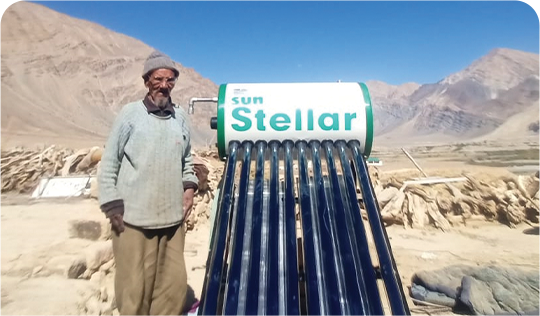
A solar heater installed in Ladakh
Enabling Watershed Development
Savitribai Phule Mahila Mandal (SPMM) works with women for the preservation and development of natural resources in their villages. The Bank has sanctioned a grant to SPMM for building watersheds in three villages of Buldhana district in Maharashtra. The project involves watershed development activities, which will benefit around 250 small and marginal farmers to pursue organic farming across 350 acres of land.
The activities include: constructing recharge pits, widening water bodies and erecting farm bunding (wall) in the targeted villages. A recharge pit is a close well-like structure that collects rainwater. The project is expected to increase groundwater level and ensure water availability for protective irrigation, reduce soil erosion and enhance crop production. It will result in increased household incomes and improved food security for the farmers.
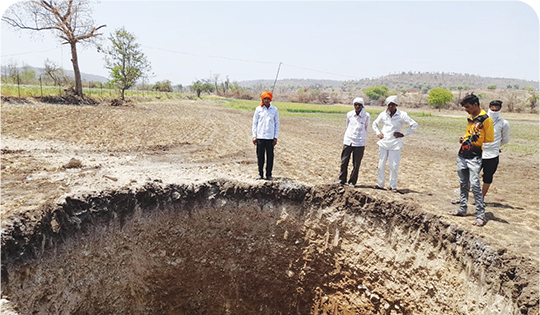
Creation of a water recharge pit at Parkhed village in Buldhana district, Maharashtra
Enabling Organic Farming
ICICI Bank has provided grant assistance to Dharamitra, a Maharashtra-based trust, to partly finance a project in 10 villages of Arvi block in Wardha district. The project involves organic farming, watershed development activities and small scale equipment centres. We are supporting them with locally grown seeds, like tur dal (a pulse variety), sorghum (jowar), tomatoes, chillies, lady fingers, as well as local manure. The project also involves setting up of three centres where locals can borrow equipment at nominal cost. The expected benefits of the initiatives include skill training in organic farming, as well as climate-friendly and resilient techniques for drought survival. It will also lead to improved income, reduced cost of cultivation and improved soil health across 450 acres of land, benefiting 300 small and marginalised farmers.
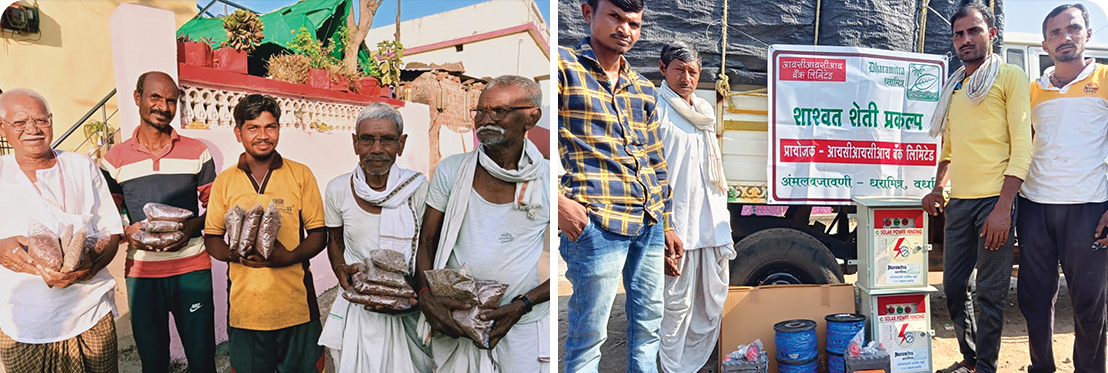
Recipients of locally grown seeds (left) at Bhadod village and solar fencing units (right) at Bothali village in Wardha district, Maharashtra
Supporting Rooftop Rainwater Harvesting
The Climate Project Foundation (TCPF), a public charitable trust, is engaged in activities related to climate change. During fiscal 2022, ICICI Bank provided TCPF with a grant for installing 162 rooftop rainwater harvesting systems in four villages, namely Bhawadi, Koregaon, Kurwandi and Thusar, of Ambegaon taluka in Pune district, Maharashtra. The project started in July and was completed in October 2021. The project has the potential to save 7.8 million litres of water a year. It has led to an effective increase in the groundwater table, ensuring availability of sufficient water for the residents of the villages, and made these villages free from tanker water.
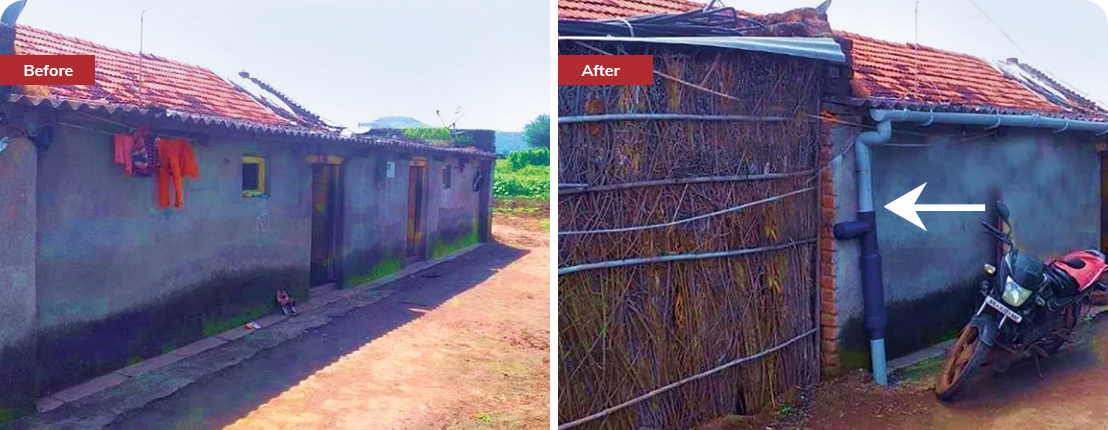
Rooftop rainwater harvesting system installed at Kurwandi village in Ambegaon, Pune district, Maharashtra
Protecting Natural Resources
ICICI Bank sanctioned a grant to Virbhadra Nature Conservation Society, a public trust based in Nagpur, for cleaning 10 water bodies in as many villages in Gadchiroli and Gondia districts of Maharashtra. The two-year project is expected to benefit about 400 households with an increased water storage capacity for irrigation of over 850 hectares of land and provision for drinking water. It will also lead to improved income opportunities with the restoration of the floral and fishing ecosystem.


